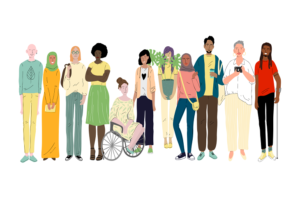Intersectionality Matters, Now More Than Ever
The discussion and analysis of intersectionality is still more important than ever in 2022. Growing from the work of Black feminist scholars and activists, intersectionality argues that individual identities such as gender, race, sexuality, and others, overlap and intersect and reflect forms of oppression and privilege. Put simply, all oppression is linked. Those phobias and isms do work hand in hand unfortunately. There are several factors in my own household that one or more of us has needed to contend with at any given time. Immigration policies, racial bias, sexism, ableism, mental health stigma, queer erasure, etc. These intersectional needs all relate though. If we want to put a stop to destructive influences like Trumpism and push back against hate, then we have to keep a pulse on the needs of our communities.
One of the most life changing elections in American history, showed us the desires of one part of the country. They were and still are willing to destroy the union because their way of life had been challenged. This feeling was lurking and moving through the country for years on its way to the polls in 2016 and we never really fixed that. Think about that, here we are, Black History month 2022 and the continuing ignorance about simple facts are enough to floor you. Then again, these things have been a problem that didn’t start overnight. All Americans should want to learn the truth of our country’s beginnings and look at what the implications are for higher education, for public discourse, and for civil society. In the context of intersectionality, as our country grows, we should want to learn how to fight for the rights of our fellow Americans who are discriminated against.
We will continue to be a nation of varied groups of people because of age, national groups, sexuality, gender, disability, and more. We have to develop— if we haven’t already, a lens for focusing in on each individual experience. If we don’t learn to see what some citizens’ lived experiences are, then we may end up perpetuating the systems of inequalities. A white woman will experience misogyny, or ableism, for example, but it will be experienced differently from any BIPOC women. Just as a Black man may experience racism differently from a Black woman, so the experiences of a member of the LGBTQ+ community may widely vary when disability, racial identity, or ethnicity are also at play. This intersectionality has been in existence long before we coined words and phrases to describe it. People had to live it. Now our work towards human rights must also be intersectional and this has always been a point of discussion among women of color especially. Any feminism that purely represents the experiences of white, or only able-bodied, or only heterosexual persons will fail to achieve equality for all women.
We know the voices of the most marginalized that are often silenced. Since the intersectionality has become more widely understood, there are critics who frame it as simply an “identity sweepstakes.” This is such a distortion. Their way of thinking about what discrimination looks like is too one dimensional. Race discrimination and sexism are not the same for everyone. There are millions of ways that power converges and can be used to help or hurt citizens. As we get to know the history, the stories, and the current experiences of our fellow Americans, then we disrupt the false assumption that intersectionality is just about “identity politics” or the numbers. It isn’t any of those things, it’s a set of real experiences. Trumpism distorted racial justice, gender, social justice, and all other forms of social equity discourse. We have been forced to confront this because it isn’t going away anytime soon. Much of it started before Trump even ran for president. But one of the many things that Trumpism taught us is nothing is just there, not even democracy itself. Everything is up for grabs. That means that we have to stabilize and nurture every concept that’s important to us.
Columbia Law Professor Kimberlé Crenshaw put it this way, “We saw what happened when people allowed lies about an election to go unaddressed. Imagine what happens when we allow ideas about social justice to go undefended?” She continued, “they have brought the fight to us. And we cannot fail to answer that. We cannot fail to stand up to it.” Also, Pulitzer-Prize Winning author Viet Thanh Nguyen has said, “My identity is deeply intertwined with being a refugee because that’s the first experience that I remember.” His experience can’t be ignored or simply pushed aside. He has pointed out the responsibility that we all have to engage in educational, anti-racist work within our own families and friend groups. Why? Because this intersectionality has always been, but we have opportunities to openly discuss it now along with interest being shown in it by our allies.
Black history will show you how many of these isms and phobias got structured into our society, our law, and our very institutions. In fact, Black History Month is an opportunity to really grapple with what white supremacy has done to our country as it nears the edge of collapse. Indeed, intersectionality is intended to ask a lot of individuals and movements alike, requiring that efforts to address one form of oppression take others into account. This is why intersectionality matters so much! Once we have worked together, since these forms of oppression are indeed linked together, the movement will be stronger and have more momentum. Remember, a unified populace is harder to dominate.


